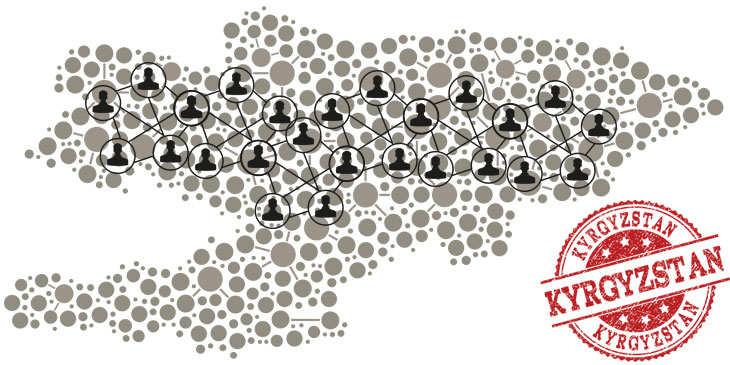Originally published on GI-ACE by Scott Newton
The Central Asia prong of our research has been examining the interplay and dynamics between informal governing networks and the formal legal–institutional system—the rules and procedures (and the way they operate) that formally structure and organise everything from government and the bureaucracy (including the justice sector and judiciary) to companies and business contracts.
We have hypothesised that much donor -funded or -encouraged law reform assistance—especially Rule of Law (RoL) programming targeted on legislation and court processes for purposes of stemming corruption—misfires because it neglects to factor in the sociopolitical realities of legal systems in network-governed contexts.
Networks of the kind that we find in Central Asia and across post-Soviet space (patronal systems) invest significant resources in configuring and then controlling the legal and constitutional systems. They facilitate corruption not by working around the law, but by working through the law—manipulating it to their own ends and shaping it in the first place. They ‘build and operate’ the legal–institutional apparatus. When networks have exercised governing power from the very inception as they have done across post-Soviet space, drafting and amending constitutions, they build and operate the state itself.
Two distinctions are really important to appreciate from the outset:
- The first is the difference between law on the books and law in practice—that is between law as codified and binding rules and procedures, on the one hand, and law as a complex social system which necessarily accommodates and indeed requires informal practices, on the other. Nowhere do rules systems function mechanically or automatically without the influence or lubricant of informal relations and practices. Indeed, ‘informal practices’ can be differentiated only against some background set of formal or official norms, which they soften or modify or selectively apply or subvert.
- The other important difference is between informal practices and informal networks. Informal networks or systems have a distinctive, privileged relation to that formal system. Our hypothesis is that governing networks, as pre-eminent collective societal and political actors in Central Asia, shape and systematise formal rule frameworks and responses to them, yielding enduring patterns. Informal networks are ultimately more threatening or subversive from a good governance or anti-corruption standpoint than informal practices per se, because networks are rival governance or political systems in their own right: they have systemic, structural and enduring properties which permit them to infiltrate and hollow out legal systems from within.
We are interested in Kyrgyzstan because it stands out as both a very elaborately networked state—with networks operating at both central and regional/local levels—and a state that has seen a great deal of legal and constitutional reform. The Kyrgyz networks have been the subject of sustained study and analysis.
Through in-depth interviews with a wide range of Kyrgyz informants (including ordinary citizens and significant economic, social, and political actors), we have been investigating the significant shifts and reconstitution of the Kyrgyz networks after recent political and structural developments, including the 2015 and 2017 elections, and the Constitutional amendments of 2010 (the new parliamentary constitution) and 2016, which made Kyrgyzstan the most formally parliamentary and least presidentialist of all Central Asian (and arguably all post-Soviet) states. Nonetheless, successive networks under Presidents Atambaev (2011-2017) and Jeenbekob (2017-date) have restored de facto presidential primacy, manipulating the new constitutional arrangements.
Preliminary findings
- Network succession: Informants described in meticulous detail the wholesale replacement in less than a year of former-President Atambaev’s network by the network of his chosen successor and protégé Jeenbekov. Furthermore, Atambaev’s arrest on criminal charges last summer demonstrates the way in which Kyrgyz governing networks have traditionally weaponised the criminal justice system for protecting and enforcing network power against any perceived challenge.
- The extraordinary durability and robustness of network-based governance: While particular networks have formed, dissolved, and re-formed around successive patrons and bosses since independence, the paradigm shows no signs of weakness or exhaustion. It is difficult to point to another case where such far-reaching and fundamental changes have been made to the basic constitutional structure over such an extended period (nearly three decades). Yet, after every set of reforms, the patterns of network control have reasserted themselves, both at central and regional levels.
- Longstanding societal adaptation and scepticism of change: Informants shared a bleak view of present circumstances and the prospects for change in Kyrgyzstan in the near future. They expect only serial replacement of networks, rather than a transformation of networked-governance into a more genuinely open-access order (as opposed to one accessible only by rival networks).
- Reassertion of local power bases: Although district representation has given way to proportional representation on the basis of national party lists in the Jogorku Kenesh, deputies continue to have regional ties and preferences, and local residents expect assistance and facilitation, particularly with respect to infrastructure.
- Ineffectiveness of gender and minority quotas: Gender and minority quotas for party lists under election regulations have been systematically manipulated and misused in a formal box-ticking exercise that defeats their ostensible purpose. Here the problem has been the informally motivated use of formal compliance by network actors.
- Transactional/relational informality as survival strategy: In the face of the power of network informality, Kyrgyz citizens have been thrown back on their own informal devices and repertoire of established practices, including those for accessing resources. Given the intransigence of governance or network informality, the background transactional/relational informality that exists in complex interdependence with it does become a matter of ‘survival.’ We intend to investigate in our further research whether and under what circumstances in the present environment of institutionalised disillusion Kyrgyz informal ‘survival strategies’ can conceivably be harnessed for good governance outcomes.
Lessons for reforms and reformers
Clearly, neither the rationale nor the impact of a proposed legal reform, even at the level of the structure of government itself, can be analysed independently of network interests and goals; it is never a matter of simply programming or reprogramming a rule- and procedure-bound bureaucratic (Weberian) governance apparatus. Rules and procedures—even constitutional rules and procedures—in a network environment are indeterminate in the first place, since they are subject to variable, inconsistent, selective, invidious, tendentious, or perverse application and enforcement in the service and interests of the network and network actors.
Moreover, the apparent paradox in Kyrgyzstan of ceaseless reform amidst entrenched network governance makes sense when the reforms are understood as network instruments but never entirely reliable instruments: the results of reforms are unpredictable and reflect intervening network contingencies and dynamics, including the rise of rival or successor networks.
It is particularly important for policymakers to reckon with the long-term consequences of serial reform failure—erosion of trust not in government (long since gone) but in politics, itself, or the very possibility of change.







